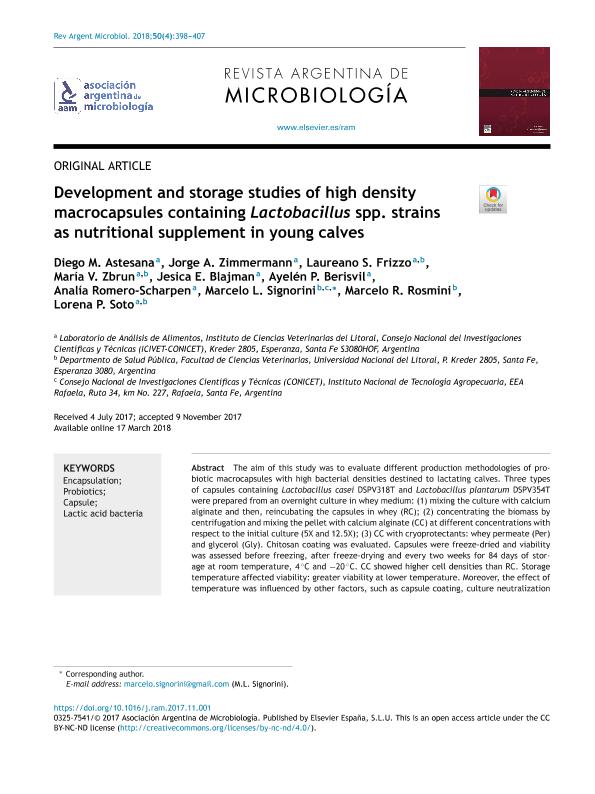Artículo
El objetivo de este estudio fue evaluar diferentes metodologías de producción de macrocápsulas probióticas con altas densidades bacterianas, destinadas a terneros lactantes. Se prepararon cápsulas con Lactobacillus casei DSPV318T y L. plantarum DSPV354T a partir de cultivos overnight en suero de queso, de 3 maneras: 1) mezclando el cultivo con alginato de calcio y luego reincubando las cápsulas en suero (RC); 2) concentrando la biomasa por centrifugación y mezclando el sedimento con alginato de calcio (CC) en diferentes concentraciones con respecto al cultivo inicial (5X y 12,5X), y 3) CC con crioprotectores: permeado de suero (Per) o glicerol (Gly). Se evaluó el recubrimiento con quitosano. Las cápsulas se liofilizaron y se evaluó la viabilidad antes de la congelación, después de la liofilización y cada 2 semanas durante 84 días de almacenamiento a temperatura ambiente a 4 o a −20 °C. Con el sistema CC se alcanzaron mayores densidades celulares que con el RC. La temperatura de almacenamiento afectó la viabilidad: se observó una mayor viabilidad a menor temperatura. Además, otros factores incidieron en el efecto de la temperatura: el recubrimiento de las cápsulas, la neutralización del cultivo y la adición de crioprotectores. El recubrimiento mejoró la viabilidad a temperatura ambiente, pero no se observó ningún efecto a 4 °C. La neutralización del cultivo permitió una mayor supervivencia durante el almacenamiento. Los crioprotectores mejoraron la viabilidad durante la congelación, pero también generaron un efecto positivo o negativo dependiendo de la temperatura de almacenamiento. Con el almacenamiento en refrigeración se obtuvieron recuentos por encima de 109 UFC/cápsula hasta el día 70 y con Gly12,5X y hasta el día 56 con Per12,5X. Con el almacenamiento a −20 °C se obtuvieron cápsulas Gly12,5X con más de 109 UFC/cápsula hasta el final del estudio (84 días). Una cápsula de 109 UFC es la dosis diaria por ternero que facilitaría la administración de este inóculo probiótico a los animales en el campo. The aim of this study was to evaluate different production methodologies of probiotic macrocapsules with high bacterial densities destined to lactating calves. Three types of capsules containing Lactobacillus casei DSPV318T and Lactobacillus plantarum DSPV354T were prepared from an overnight culture in whey medium: (1) mixing the culture with calcium alginate and then, reincubating the capsules in whey (RC); (2) concentrating the biomass by centrifugation and mixing the pellet with calcium alginate (CC) at different concentrations with respect to the initial culture (5X and 12.5X); (3) CC with cryoprotectants: whey permeate (Per) and glycerol (Gly). Chitosan coating was evaluated. Capsules were freeze-dried and viability was assessed before freezing, after freeze-drying and every two weeks for 84 days of storage at room temperature, 4 °C and −20 °C. CC showed higher cell densities than RC. Storage temperature affected viability: greater viability at lower temperature. Moreover, the effect of temperature was influenced by other factors, such as capsule coating, culture neutralization and cryoprotectants. Coating improved viability at room temperature; however no effect was observed at 4 °C. Culture neutralization allowed greater survival during storage. Cryoprotectants improved viability during freezing, but they also generated a positive or negative effect depending on storage temperature. The best results were: at refrigeration Gly12.5X exhibited counts above 109 CFU/capsule until day 70 and Per12.5X until day 56 of storage and at −20 °C Gly12.5X showed counts above 109 CFU/capsule until the end of the study (84 days). A 109 CFU capsule is the daily dose per calf which would facilitate the administration of this probiotic inoculum to field animals.
Development and storage studies of high density macrocapsules containing Lactobacillus spp. strains as nutritional supplement in young calves
Título:
Desarrollo de macrocápsulas con cepas de Lactobacillus spp. en alta densidad como suplemento nutricional de terneros jóvenes y análisis de su viabilidad durante el almacenamiento
Astesana, Diego Martín ; Zimmermann, Jorge Alberto
; Zimmermann, Jorge Alberto ; Frizzo, Laureano Sebastian
; Frizzo, Laureano Sebastian ; Zbrun, María Virginia
; Zbrun, María Virginia ; Blajman, Jesica
; Blajman, Jesica ; Berisvil, Ayelén Patricia
; Berisvil, Ayelén Patricia ; Romero Scharpen, Analía
; Romero Scharpen, Analía ; Signorini Porchietto, Marcelo Lisandro
; Signorini Porchietto, Marcelo Lisandro ; Rosmini, Marcelo Raul; Soto, Lorena Paola
; Rosmini, Marcelo Raul; Soto, Lorena Paola
 ; Zimmermann, Jorge Alberto
; Zimmermann, Jorge Alberto ; Frizzo, Laureano Sebastian
; Frizzo, Laureano Sebastian ; Zbrun, María Virginia
; Zbrun, María Virginia ; Blajman, Jesica
; Blajman, Jesica ; Berisvil, Ayelén Patricia
; Berisvil, Ayelén Patricia ; Romero Scharpen, Analía
; Romero Scharpen, Analía ; Signorini Porchietto, Marcelo Lisandro
; Signorini Porchietto, Marcelo Lisandro ; Rosmini, Marcelo Raul; Soto, Lorena Paola
; Rosmini, Marcelo Raul; Soto, Lorena Paola
Fecha de publicación:
10/2018
Editorial:
Asociación Argentina de Microbiología
Revista:
Revista Argentina de Microbiología
ISSN:
0325-7541
e-ISSN:
1851-7617
Idioma:
Español
Tipo de recurso:
Artículo publicado
Clasificación temática:
Resumen
Palabras clave:
Encapsulación
,
Probióticos
,
Cápsulas
,
Bacterias Ácido Lácticas
Archivos asociados
Licencia
Identificadores
Colecciones
Articulos(CCT - SANTA FE)
Articulos de CTRO.CIENTIFICO TECNOL.CONICET - SANTA FE
Articulos de CTRO.CIENTIFICO TECNOL.CONICET - SANTA FE
Articulos(ICIVET-LITORAL)
Articulos de INST. DE CIENCIAS VETERINARIAS DEL LITORAL
Articulos de INST. DE CIENCIAS VETERINARIAS DEL LITORAL
Citación
Astesana, Diego Martín; Zimmermann, Jorge Alberto; Frizzo, Laureano Sebastian; Zbrun, María Virginia; Blajman, Jesica; et al.; Development and storage studies of high density macrocapsules containing Lactobacillus spp. strains as nutritional supplement in young calves; Asociación Argentina de Microbiología; Revista Argentina de Microbiología; 50; 4; 10-2018; 398-407
Compartir
Altmétricas



